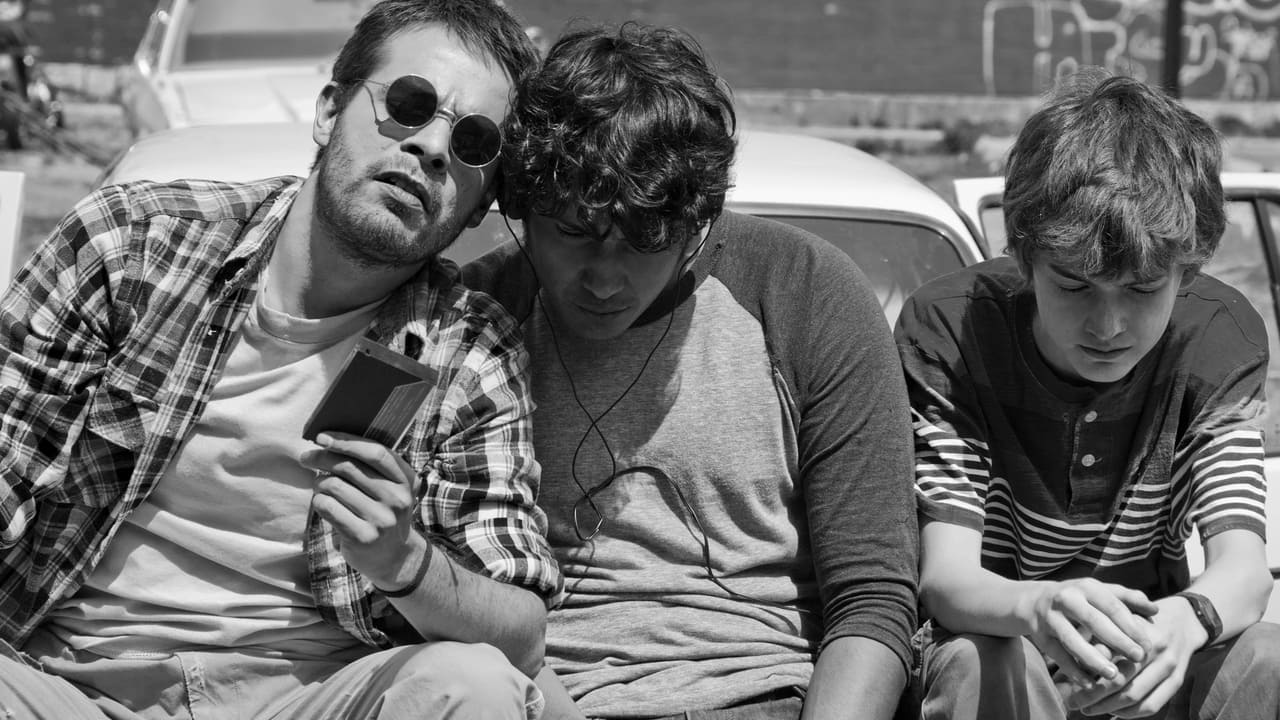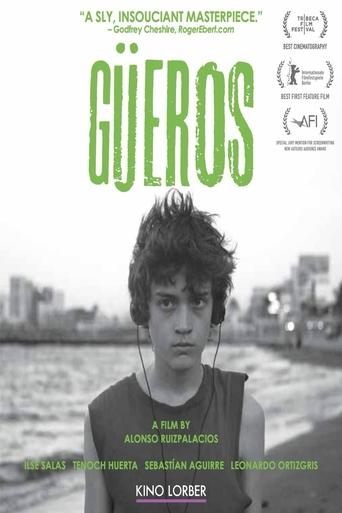

Very well executed
... View MoreLet's be realistic.
... View MoreI am only giving this movie a 1 for the great cast, though I can't imagine what any of them were thinking. This movie was horrible
... View MoreThe story, direction, characters, and writing/dialogue is akin to taking a tranquilizer shot to the neck, but everything else was so well done.
... View MoreA hip coming of age road movie is the first feature from gifted Mexican writer- director Alonso Ruizpalacios. Shot in academy ratio and black and white and marked by a fresh use of camera, editing, sound, and humor and a breaking the fourth wall that owes something to the Nouvelle Vague, it focuses on Tomás, a slim, pale teenage bad boy ("güero" is Mexican slang for light-skinned) whose mother can't cope with him, so sends him from Veracruz to live in Mexico City for a while with his older brother "Sombra" ("dark-skinned"). Sombra is a student at the national university, but it's disrupted by a huge strike (loosely based on the 11-month strike of 1999), and he's "on strike from the strike," sitting idly in his trashy concrete apartment, a depressed slacker trying to teach himself card tricks. They get out, with his roommate and best friend Santos and girlfriend Ana (a strike leader), on a mission to find a cult Mexican rock idol of the Sixties called Epigmenio Cruz admired by their late father and both brothers, reportedly dying of cirrhosis of the liver, to pay him homage. It's said that Cruz once "made Bob Dylan cry." Ruizpalacios has acknowledged a debt to Truffaut, Godard, Wim Wenders, Jim Jarmusch, and Fellini, but his light touch, wit, and grasp of earthy Spanish vernacular (though he studied in London and speaks perfect English too) also link Güeros with Latin American youth films like Alex dos Santos' 2006 Glue, Che Sandoval's You Think You're the Prettiest, But You Are the Sluttiestt (2009), and the work of Fernando Eimbcke and Gerardo Naranjo. This won prizes at Berlin and Tribeca and had a limited US release May 2015 (see A.O. Scott's enthusiastic and detailed description in the NYTimes). Now out on DVD from Kino Larber. Watched on a DVD provided by Rodrigo Brandão (Indie Strategy) 2 Jan. 2015.
... View MoreThe story here is as clever as it is simple. Two brothers and a friend hit the road in search of a dying Mexican folk singer who, according to legend, once made Bob Dylan cry with one of his touching ballads. While there are numerous side stories and plenty of character development, the plot doesn't get a whole lot deeper than that, and it is all the better for it. In that sense, the filmmakers knew exactly what they were doing and they achieved it wonderfully.The film has a few flaws, but overall I thought it was pretty good. It could have been shorter, but the pacing is great. I felt like a few of the scenes were added just to ensure a sufficient running time and they could have been cut. One thing I loved about the film was that we never actually hear the music of the fictional Mexican folk singer that the brothers are following. Their car's cassette player is broken so they only ever listen to him via headphones. We are left to watch their silent reactions and fill in the missing pieces for ourselves. I'm not sure if the filmmakers had intended to possibly insert music during post production and then decided against it, but either way it is very effective and well done.Without giving anything away, the ending of the film is right in line with the rest of the film's pacing. It is slow and anticlimactic, but we still end up feeling like everything turned out just the way it should, much like the characters are left feeling. And it is totally hilarious, but in such a dry way that you just might miss it.Despite being a road film in essence, with characters traveling around and getting into adventures, Güeros isn't about story or characters so much as it is about a feeling. It's a feeling that most of us likely experience at some point in our lives, and for that reason most people will be able to relate to this film on some level.
... View MoreNot worth a watch, I'm surprised by the good reviews it's getting, making me think that the people involved in the film are the ones writing the good reviews. Shot in black and white for no reason, follows 4 people doing nothing and fails in portraying the student's movement that serves as a background. it's just boring, I felt that they tried to achieve something like the great "Duck Season" but they failed, if you haven't watched Duck Season, watch that instead. This just gives me no more material to write about. Describing this in a sentence I'll just go for: A plain road trip with no interesting characters that will waste your time
... View MoreSet in 1999 against a backdrop of student protests, Güeros is a road movie that becomes a voyage of discovery for three rootless young people seeking to bridge the gap between aimlessness and social purpose. The debut feature film by Mexican director Alonso Ruizpalacios received twelve nominations at the 57th Ariel Awards, the Mexican equivalent of the Oscars, winning five of them including Best Film, Best Director, Best First Film, Best Sound, and Best Cinematography (Damian Garcia). Shot in black-and-white, the film is evocative of the French New Wave, balancing highly structured sequences with segments of spontaneous and playful improvisation.In the film, Tomas (Sebastian Aguirre), a disruptive pre-teen in Veracruz is sent by his overburdened mom to Mexico City to live with his brother Federico (Tenoch Huerta), a slacker college student known as Sombra because of his dark skin. Tomas is called a "güeros" because of his lighter complexion underscoring an element of racial conflict in Mexican society. Living with his similarly uninvolved roommate, Santos (Leonardo Ortizgris) in an apartment complex in Copilco that looks as if it's next on the waiting list for demolition, Sombra's position on the student strike is firmly in the middle, saying that he is "on strike against the strike." His daily activity consists of well, nothing much. He and Santos sit around watching TV by borrowing an electrical cord from a little girl downstairs, an action that does not sit too well with the girl's father.Bored, Tomas decides that a little adventure never hurt anyone and comes up with a plan to find Epigmiento Cruz in order to have him sign their well-worn cassette tape. An enigmatic folk singer from the sixties who their father loved, Cruz is a symbol of something bigger than them,a larger than life hero who can make them see what's behind things. As Sombra says, "If you can see behind things, the only thing they can't take away from you is that feeling." Though the singer is rumored to be sick or dying, little güerito tells Fede that Cruz "once made Bob Dylan cry," presumably an accomplishment worthy of a place in the hall of fame. The trip, according to Ruizpalacios, was inspired by Bob Dylan's journey to visit an ailing Woody Guthrie in the hospital during the late 50s. Shrugging off a panic attack which is carefully explained to him at the hospital, Sombra visits the Universidad Nacional Autónoma de México (UNAM) where students are on strike to show their disagreement with the administration's decision to instate an enrollment fee even though the University had always been free. Sombra, Santos, and Tomas walk into an auditorium overflowing with protesters listening to Sombra's former girlfriend Ana (Ilse Salas) speaking in front of the room. The scene is filled with shouting and confrontation, a chaotic depiction not to the liking of some former protesters who complained about the unserious tone of the segment. As Ana joins the trio to look for Cruz, their quest leads them to a pool party where well-to-do intellectuals muse about the sorry state of Mexican cinema.Here the film engages in a sort of self-parody as one director complains that all Mexican movies deliver a picture of impoverished beggars to satisfy Western audiences at film festivals. Sombra also chimes in, saying that Mexicans are often portrayed as cheaters, atheists, prostitutes and alcoholics. Güeros ultimately takes many detours and shifts of perspective but, though it is episodic in structure, never loses its footing as the search for the legendary Epigmiento allows the seekers to move from a place of apathy to one of self-acceptance and commitment.Ruizpalacios describes the film's central theme as "the change from being static to being in movement. Healing through movement." However you interpret Güeros' message, the film has an invigorating appeal: fresh, playful, and meaningful, even suggesting at one point that the seeming randomness of life is guided by divine purpose. Sombra says at one point that "If the world is a train station and the people are the passengers, those who stay at the station and watch the trains go by are the poets, the ones who come and won't go." Tomas is one who watches the trains depart, seeing as we all have once with the innocent eyes of discovery as the city unfolds before his eyes with all its massive contradictions, encompassing the best and worst of humanity.
... View More